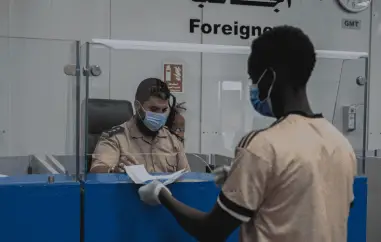Planned labor migration: Germany is courting skilled workers in Ghana
 Germany wants to recruit more skilled workers from Ghana. During their visit to the West African country, Federal Development Minister Svenja Schulze and Federal Labor Minister Hubertus Heil (both SPD) presented a corresponding initiative on Tuesday. The migration center in the capital Accra, which has been supporting Ghanaian returnees since 2017, will now also provide information on legal migration routes for skilled workers to Germany and Europe.
Germany wants to recruit more skilled workers from Ghana. During their visit to the West African country, Federal Development Minister Svenja Schulze and Federal Labor Minister Hubertus Heil (both SPD) presented a corresponding initiative on Tuesday. The migration center in the capital Accra, which has been supporting Ghanaian returnees since 2017, will now also provide information on legal migration routes for skilled workers to Germany and Europe.
"Securing skilled workers is securing prosperity for our country," Heil said. "We must pull out all the stops at home and abroad to attract qualified skilled workers." At the same time, Schulze stressed that migration policy is closely linked to development policy. "Properly managed, migration holds enormous potential for economic development in our partner countries, but also in our own."
Good solutions could be found together for the shortage of skilled workers in Germany and the high youth unemployment in countries like Ghana. Labor migration could strengthen development in the country of origin, for example through remittances and knowledge transfer.
One area in which there is a particularly high demand for skilled workers in Germany is nursing. According to the World Health Organization (WHO), however, there is also a critical shortage of healthcare and nursing staff in Ghana. The WHO therefore recommends against recruiting for this sector from countries such as Ghana, and private agencies are not allowed to recruit nursing staff in these countries for the German market. Other countries where Germany wants to invest in migration centers are also on the WHO list.
In the initiative of "Centers for Migration and Development", which is supported by the EU and includes the center in Accra, the Ministry of Development wants to invest 150 million euros in the coming years. Further centers are planned in Morocco, Tunisia, Egypt, Jordan, Nigeria, Iraq, Pakistan and Indonesia. Germany will invest ten million euros in the center in Accra over the next three years, while the EU will contribute six million euros.
Ghana has been one of the priority countries for German development cooperation since 2017. Because Ghana is considered a safe country of origin, most Ghanaians who enter Germany illegally are only tolerated and have no prospect of permanent residence status. In 2021, according to the Federal Office for Migration and Refugees, 125 Ghanaians used the option of voluntary return to their home country.
Photo by Moayad Zaghdani









































